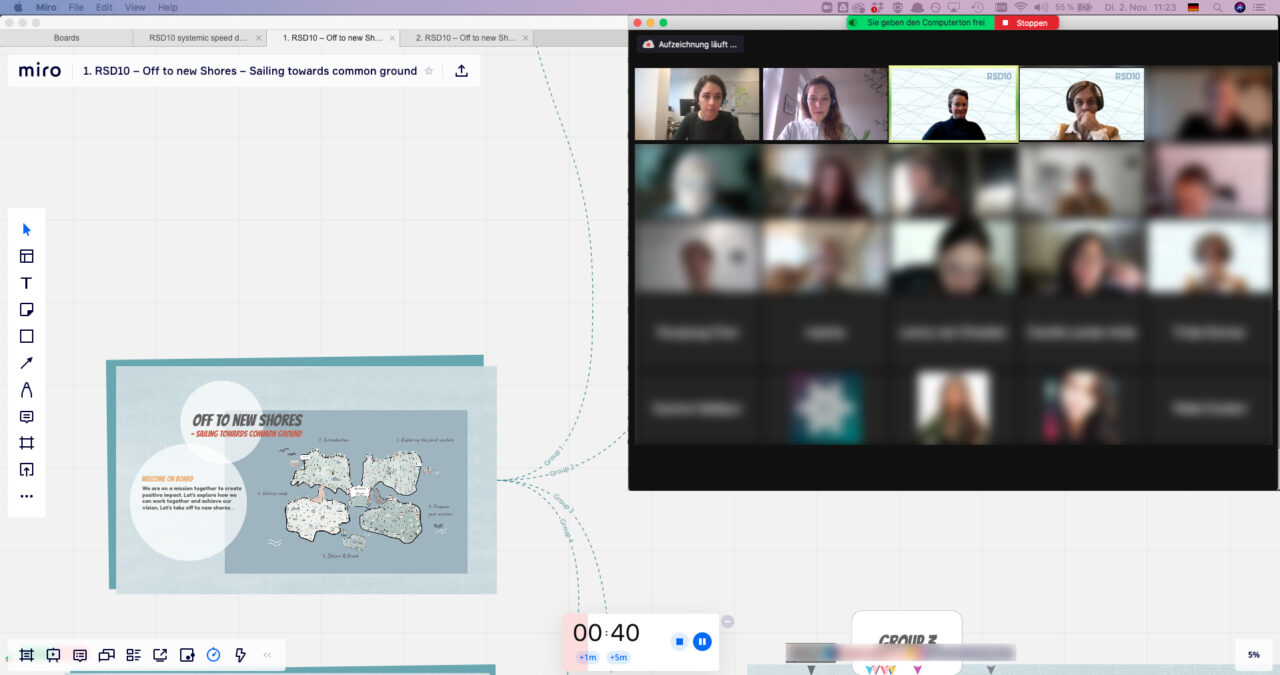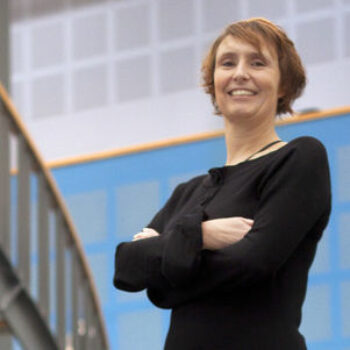Playing with tensions to scale social innovation
Tensions are inevitable in our complex world. Over the past year, Maria has experienced the crucial role of tension points when designing for, and in the context of social innovations. As an embedded designer, she had a unique role within multi-stakeholder social innovation projects and experienced the multitude of perspectives, goals and ambitions that can cause misunderstandings in such complex projects. Moreover, she was dealing with uncertainties and was challenged by switching roles from being a facilitator, teacher, designer to a researcher. Maria took the premise to address and deal with tensions in a fruitful way. More specifically, her project evolved around the productive role of friction to uncover different perspectives and create an environment where a shared understanding between a diverse group of stakeholders (like in social innovation projects) can be achieved.
Beyond graduation, PCM lab alumna Maria Belén Buckenmayer further digested the insights gained as an embedded designer within the DESIGNSCAPES project. The resulting outcomes are fruitful and disseminated in a triplet of audiences. First, a full paper, ‘Fruitful friction as a strategy to scale social innovations’, has been accepted at the international symposium Relating Systems Thinking and Design (RSD10) hosted at the Delft University of Technology, The Netherlands. Second, she hosted a workshop entitled ‘Off to new shores. Sailing towards common ground’ at the same occasion. At last but not least, the project was showcased at the Dutch Design Week as part of the Up Close & Personal programme.
Relating Systems Thinking & Design Symposium
The theme of the symposium this year was “Playing with tensions”, embracing new complexity, collaboration and contexts in systemic design. Given the current pandemic, the conference was held in a hybrid way. A mix of online and offline (live-streamed) lectures, workshops and discussions, allowed participants from all over the world to partake from home. Maria had two contributions for the symposium.
The fruitful friction towards common ground framework
For one, together with Ingrid Mulder and Milene Gonçalves, she got a full paper accepted entitled “Fruitful friction as a strategy to scale social innovations”. The presented framework applies the notion of fruitful friction and puts it in a sense-making process in order to create a shared understanding in multi-stakeholder projects. As part of the long paper track, the work was presented in an online session within the theme “Sensing Momentum in System Dynamics”. After Maria’s presentation, the audience engaged in a rich Q&A, addressing topics around the right timing, the needed level of alignment and the mediation of power dynamics. Through the discussion, Maria and Ingrid could detail project-specific aspects in a more differentiated manner and highlight implications that the research has for the DESIGNSCAPES project. Besides Maria, two other researchers presented their papers in that session: Anja Overdiek and Ryan Murphy. There was a great overlap in topics, the different papers and presentations addressed, which motivated a very vibrant and insightful plenary discussion. It was great to see that not only the presenters were engaged, but also that the whole audience took part in the discussion. The overall reflection evolved around the interconnectedness of other forms of scaling (e.g., scaling back or scaling in) and discussed the systemic relevance of design and remaining opportunities to expand our knowledge in this domain.
If you are curious to know more about the framework, the full paper can be read here.

Off to new Shores!
On the first day of the RSD10 conference, Maria also facilitated a two-hour online workshop session called “Off to new shores – Sailing towards common ground”. The workshop acts as an extension of the framework and translates the conceptual process into an actionable design. Participants of the session learned about and applied the concept of fruitful friction and experienced the power of metaphors as a tool to express intangible perspectives.
In the workshop, potential friction points are triggered deliberately to uncover differences in people’s ways of thinking. Reflecting and becoming aware of one’s own and other peoples’ mindsets gives room for change and alignment to happen. Hereby, metaphors and working visually help to express more intangible and implicit aspects. This is one reason why in the workshop the metaphor of sailing towards new shores is used.

Due to the online setting of the symposium, more than 20 participants engaged in the different activities on the Miro board. With Milene Gonçalves as co-facilitator and technical support of the conference team, it was a smooth and interactive workshop. The session was a mutual learning experience. Facilitating this workshop and gathering feedback from participants allowed us to gain new insights into the application of the framework and the workshop. On the other hand, participants got to experience a new method to engage and connect with stakeholders on a deeper level. This was reflected by the active engagement of the participants during the session and the reaction of the RSD10 conference team. One of the organisers was impressed how participants opened up during the workshop and openly reflected on their perspective.
“Great job. Was amazing to see how your participants open up and share their mission. Looking forward to your paper presentation too” – Rebecca Price, RSD10 organiser committee
A main take-away from this session is the importance of the facilitator as a mediator, to mitigate tensions and be the neutral party that ensures everybody’s voice gets heard.
Get access to the toolkit by dropping Maria an email. Find more information about the workshop here.
Up Close & Personal @DDW
The Up Close & Personal is an event that takes place during Dutch Design Week in Eindhoven. It aims to fuel the debate on Design Research of the four Dutch technical universities. This year, five contemporary themes were up for discussion. In different formats, like live-streamed talk shows, an exhibition and a magazine, the role that design can play in tackling these themes was explored.
One of the five themes this year was “Embedded Design”. How are designers embedded in the ecologies in which they design and intend to transform? Their mere presence is not neutral. How do they choose their position? How do they deal with situations in which they find themselves, and how do they enable change: from within or from the outside, as humble catalysts, or as outspoken activists?
Maria’s work got published in the e-magazine under the embedded design theme. In the article, Maria takes a more reflective perspective, identifying the implications of being an embedded designer in the context of social innovations for her project. Her fluid role during the process, her participatory and co-creative approach, as well as her take on facilitating change, provided one example of a designer who is embedded in the context they are designing for.
Read the article in the e-magazine here.
To cite the work, please refer to it as follows:
Buckenmayer, M.B., Goncalves, M., & Mulder, I. (2021). Fruitful friction as a strategy to scale social innovations. In: Proceedings of Relating Systems Thinking and Design (RSD10) 2021 Symposium. Delft, The Netherlands, November 2-6, 2021. https://rsdsymposium.org/fruitful-friction-as-a-strategy-to-scale-social-innovations/
Buckenmayer, M.B., Goncalves, M., & Mulder, I. (2021). Off to new shores. Sailing towards common ground. In: Proceedings of Relating Systems Thinking and Design (RSD10) 2021 Symposium. Delft, The Netherlands, November 2-6, 2021. https://rsdsymposium.org/off-to-new-shores-sailing-towards-common-ground/
Buckenmayer, M.B., Mulder, I. & Goncalves, M. (2021). Are we on the same page? Introducing fruitful friction as a strategy to reach common ground. How can designers use friction to trigger change in people’s mindsets? In: Up Close & Personal e-magazine, Embedded Designers, Dutch Design Week 2021, October 18-22, 2021, Eindhoven, the Netherlands. Available online: https://2021.design-united.nl/day-4-embedded-designers/are-we-on-the-same-page/
Acknowledgement
Thanks to the collaboration with Designscapes and the DDL Participatory City Making, from the beginning on, Maria was able to co-create, test and evaluate her ideas and solution with social innovators throughout her process.
